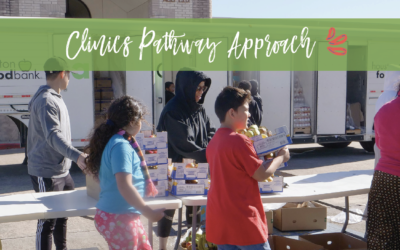JANUARY–MAY 2026
Episcopal Health Foundation is pleased to share the first Grant Guidance as part of our finalized Strategic Framework 2025–2030. This framework guides work to change systems and remove barriers to improve health, not just health care, for all Texans.
Please review EHF’s Strategic Framework and Grant Guidance before applying.
We invite existing and new partners, community-based groups, service providers, policy advocates, collaborative networks, and other organizations to explore EHF’s funding opportunities.
The initial open call for 2026 Grant Opportunities prioritized three of EHF’s Impact Drivers:
Applicants will be notified soon regarding whether they are invited to move forward with submitting a full application. Those applications will be due on March 6 and grant awards will be announced on May 28.
We anticipate sharing details about the next open call for 2026 funding opportunities in June.
Learn More
Learn more in this webinar about EHF’s finalized Strategic Framework and Grant Guidance. We’ll walk through the framework, explain the Impact Drivers, and share complete details about the open-call grant application process.
November 13, 2025
1:00-2:30 p.m. CST Informational Webinar – Watch Here
January 5, 2026
January 16, 2026
Letter of Inquiry (LOI) Submissions Due by 5pm
March 6, 2026
Application Due
May 28, 2026
Notification of Award
EHF makes grants to nonprofit, tax-exempt organizations whose work relates directly to EHF’s Strategic Framework. To be eligible, an organization must have received an Internal Revenue Service Determination Letter indicating that it is an organization described in Section 501(c)(3) or 170(c) and is not a private foundation within the meaning of Section 509(a) of the U.S. Internal Revenue Service Code.
All grants funded by EHF must be implemented within the 81-county service area of the Episcopal Diocese of Texas.
Funding Eligibility
How do I apply for funding from EHF?
We have now released detailed Grant Guidance and submission dates for funding opportunities in 2026
Do you restrict your giving to a geographic area?
Yes. We only make grants to organizations that serve communities within the boundaries of the Episcopal Diocese of Texas. Click here to see a map of our service area.
What EHF does not fund:
- Grants to individuals
- Grants to underwrite conferences, luncheons, galas or fundraisers, or special events such as health fairs
- Grants for capital projects except by invitation from EHF
- Grants for scholarships
- Grants for religious purposes or congregational ministries
- Grants to public agencies for routine service provision
- Grants to retire operating deficits or debt except by invitation
- Grants for acute care, inpatient care or long-term care institutions
- Grants for emergency assistance organizations for routine service provision except by invitation from EHF
- Grants for research
- Grants to schools for academic purposes
- Grants for disease- or condition-specific organizations outside of our strategic priorities for program, research or advocacy work
- Direct or indirect support for candidates, political parties, 501(c)(4) organizations or Political Action Committees
Does my organization have to be affiliated with the Episcopal Church in order to apply?
No. While the Episcopal Health Foundation exists as a supporting organization of the Episcopal Diocese of Texas, we do not require an applicant’s affiliation with the Episcopal Church or any other faith community in order to be considered for funding.
Can a church apply to EHF for funding?
Congregations are not eligible for EHF grants. EHF provides financial support to congregations for training and education in capacity building. If you are interested in applying for support or want to learn more about EHF’s offerings that are specific for congregations, contact our Congregational Engagement team.
What legal status must my organization have in order to apply?
EHF makes grants to nonprofit, tax-exempt organizations and other organizations that qualify for tax-deductible contributions, including local governments and local government corporations. To be eligible, an organization must have received an Internal Revenue Service Determination Letter indicating that it is an organization described in Section 501(c)(3) or 170(c) and is not a private foundation within the meaning of Section 509(a) of the Internal Revenue Code.
Does EHF make grants to support research?
Generally, we do not make grants for research. We do conduct research of our own. We may also commission research from others that supports our work. A request for proposal process is generally used in those circumstances.
What is EHF’s indirect cost policy?
EHF will allow for indirect costs only for restricted grant budgets. Indirect costs are calculated based on expenses for salary (for personnel) and fringe benefits. For agencies whose annual budget is $500 million or less, the indirect cost rate may not exceed 20 percent. For agencies and academic institutions, whose annual budget is $500 million or more, the indirect cost rate may not exceed 10 percent.
Applicants requesting indirect costs should include such costs as a line item within the project/program budget and demonstrate how the amount being requested is calculated. This may include showing how specific indirect costs are allocated or providing evidence of a negotiated indirect cost rate.
Application Process & Fluxx
Who do I contact if I have questions about the grant application process or need technical support?
Email us at applicationassistance@episcopalhealth.org.
Who do I contact if I have programmatic questions about my current grant?
- Your Program Officer is the best contact for questions about your grant goals, activities, or outcomes. Their contact information is included in your grant application invitation email. Their name is also on your grant application in Fluxx.
- If you need help reaching your Program Officer or one has not yet been assigned to you, please reach out to applicationassistance@episcopalhealth.org.
What do I do if I forget the password to my current grant portal account?
- On the grant portal login page, select the option to reset your password.
- Enter the email address associated with your existing account.
- The system will verify your email and send instructions to create a new password.
What do I do if I want to change the email or password on my existing application account?
- To change your password, go to the grant portal login page and click the “Forgot Password”.
- To update the email address linked to your account, contact the Grants Management Team at applicationassistance@episcopalhealth.org.
Is there a User’s Guide available for EHF’s current Online Application Process?
Yes, click here to view the grant portal login instructions for new applicants and for returning grantees.
Can multiple users share the same Fluxx account?
Because the grants portal uses multi-factor authentication, we strongly recommend users do not share accounts. If multiple users need access, each individual should request their own log in.
Do I have to select an Impact Driver during the application process?
Selecting a specific Impact Driver(s) is not required during the application process as EHF will determine the most appropriate alignment during review.
How do I submit an Letter of Inquiry (LOI) for general operating support?
General operating grants are new for EHF so they haven’t been incorporated into our regular grant application cycle. If you would like to be considered for a general operating grant, please reach out to your Program Officer.
When is the right time to reach out to a Program Officer regarding my interest in applying for a grant?
EHF values relationships with our partners and transparency in our process, so grantee partners and potential applicants are welcome to talk with a Program Officer at any time during the year.
Reach out directly to the Program Officer listed in your Fluxx account, or email applicationassistance@episcopalhealth.org to be connected.
Why was my Letter of Inquiry (LOI) or grant application declined?
EHF’s Board of Directors makes the final decision on whether to approve or decline each grant. Because funding requests far exceed our available budget, we cannot support every worthy project. A decision not to fund a proposal does not reflect on the merits of the proposal or the applicant organization.
EHF’s Letter of Inquiry (LOI) process is designed to help us learn about your work and how it connects to our shared goals for systems change in Texas. Please be concise, but do not worry about perfect phrasing. We are most interested in understanding your purpose, approach, and connection to the community.
To submit an LOI, please log into EHF’s Grantee Portal. You will find the “Start an LOI” link at the top of the grant portal overview page. If you have any issues registering or logging into the portal, please reach out to applicationassistance@episcopalhealth.org.
LOI submissions close on January 16 at 5pm.
LOI QUESTIONS:
- Project Purpose (150 characters or less) Describe the main focus or goal of this project.
- Project Rationale (1800 characters or less)
Please use the following questions to guide your response:
· What unmet need or opportunity does this project address?
· How do you plan to address it through this project?
· At the end of the project, what will “success” look like? - Project Budget
· What is the total project budget?
· How much funding are you requesting from EHF? - Project Timeline
· Anticipated start date
· Estimated duration (in months) the requested funding would cover - Geography
· From which county will this grant be administered?
· Which county or counties in the Episcopal Diocese of Texas will this project directly impact? Select up to 10 counties.
Note: “All 81 counties” is also an option.


